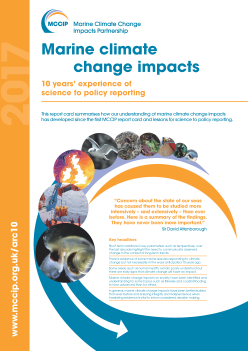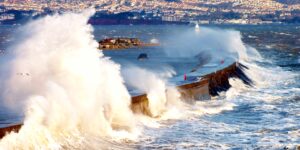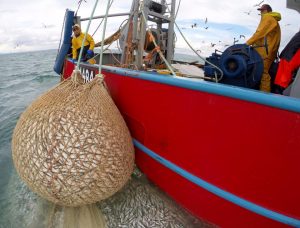 In 2006, a partnership of UK scientists, government, agencies and non-governmental organisations (NGOs) established the Marine Climate Change Impacts Partnership (MCCIP); a group formed to bring together the UK’s expertise across marine and climate science. A decade later, MCCIP has just published its eighth marine climate change impacts report card.
In 2006, a partnership of UK scientists, government, agencies and non-governmental organisations (NGOs) established the Marine Climate Change Impacts Partnership (MCCIP); a group formed to bring together the UK’s expertise across marine and climate science. A decade later, MCCIP has just published its eighth marine climate change impacts report card.
I have been working on the MCCIP programme since its inception, and am very proud that we are marking our ten-year anniversary with the release of the 2017 report card - our most ambitious report yet. As a partnership, we decided to use our latest card to reflect on how our understanding of marine climate change science has evolved over the past decade, and the lessons we have learnt about effective communication with policy makers and wider stakeholders.
The latest card builds upon contributions from 400 scientists to MCCIP report cards over the past decade, and Sir David Attenborough has said of the 10-year endeavour:
Concern about the state of our seas has caused them to be studied more intensively – and extensively – than ever before. Here is a summary of the findings. They have never been more important.
Indeed, the extensive findings from this report card (and associated Science Reviews) range across the full spectrum of marine and climate change science, including (amongst others) impacts on fisheries, temperatures, oceanographic processes, pH balances, and seabirds.
In the 2017 report card, the MCCIP partnership finds that:
- Despite year-to-year fluctuations in temperature over the past decade, a long-term underlying warming trend is still clear. Some of this variability can be accounted for through short-term changes in the strength of Atlantic Ocean circulation, which has been linked to recent severe winters in the UK.
- Climate change is clearly affecting marine species and habitats, but not necessarily in the ways anticipated 10 years ago. Some warm-water marine species such as squid and anchovies targeted by fishers have become more common place in UK waters , with clear links to climate change, whilst for non-native species, other factors (e.g. ballast water, ship hulls) have been more important for their establishment.
- Seabirds in the UK face an uncertain future due to climate change, with the productivity of some species such as fulmars, Atlantic puffins, little and Arctic terns and black legged kittiwakes being impacted by temperature rise, whilst severe storms are affecting breeding success of razorbills.
- Ocean acidification has become established as a major issue for marine ecosystems, and may be taking place at a faster rate in UK seas than in the wider north Atlantic. Overall the impacts are expected to be negative, most notably for shellfish growth and harvest in future decades.
- Extreme high-water events are becoming more frequent at the coast due to sea-level rise. However, this has not led to a corresponding increase in coastal flooding to date due to continued improvements in flood defences, emergency planning, forecasting and warning.
I have witnessed the key role that Cefas has played is success of the partnership since its inception. We provide the secretariat for the partnership and 32 of our scientists have contributed widely to all report cards. Working closely with our colleagues and peers across partner organisations and the scientific community, we established a clear shared vision, and MCCIP quickly became established as a trusted, authoritative, voice on the impacts of climate change at the coast. I am very pleased to note the interest our model and collaborative ethos has received, even being adopted elsewhere in the UK and internationally.
All of those involved in MCCIP have played a valuable role in highlighting marine climate change issues, from large scale impacts on ocean circulation (and the effects this has on the climate we ‘enjoy’ in the UK) to the harmful effects microscopic algae and pathogens might have on our health. These issues present significant challenges to how we manage marine resources and conserve species and habitats, some of which we are only starting to understand. In ten years’ time, the MCCIP hope to continue to play a key role in communicating marine climate science; helping to inform the important decisions we need to make to ensure clean, safe, healthy and productive seas in the face of climate change.
Paul Buckley is a Marine Climate Change Scientist at Cefas. He has contributed to MCCIP for over 10 years and sits on the MCCIP Secretariat.

